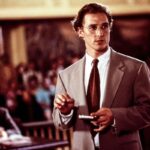Home Video Hovel: Foreign Correspondent, by David Bax
I first saw Alfred Hitchcock’s Foreign Correspondent in a class in film school about war propaganda in cinema. A large part of the discussion at the time focused on the film’s final scene. And rightfully so; it makes quite an impression. But in the two hours leading up to the overt plea at the end of the 1940 movie, Hitchcock and his screenwriters are making a case that war is here and isolationism on America’s part isn’t going to do anyone any good. And he’s doing all this while unfurling one of the most rollicking films of his career.
Joel McCrea plays an American reporter sent to Europe to investigate the growing threat of Adolf Hitler and the Nazis. When he is a witness to an assassination, he becomes Hitchcock’s favorite archetype, the ordinary guy caught up in extraordinary things.
Comparing Foreign Correspondent to previous Hitchcock films such as The Man Who Knew Too Much and The Lady Vanishes (both also available on Criterion Blu-ray), you’ll find in this work a preponderance of lavish sets and location photography. Clearly he had a budget to work with. Perhaps this is because of the director’s more solidified reputation as a maker of hits. Or perhaps it’s because his backers (such as David O. Selznick, who would later make such films as the homefront propaganda piece Since You Went Away) wanted the message about the coming war to be heard loud and clear.
The spectacle of the film is on display early, starting with the aforementioned assassination, a bravura sequence that take place on the vast stairs outside an embassy building in the pouring rain. The frame, showing us the scene from above, is filled from end to end with shiny, black umbrellas. The bold solemnity these suggest is a startling backdrop for the sudden outbreak of violence. This is followed by a car chase that has cars and bullets tearing through the countryside, culminating in a stunning set-piece inside a windmill. The new Blu-ray showcases cinematographer Rudolph Maté’s mobile compositions of warm light and encroaching shadow brought on by the mill’s blades. Later, Hitch dazzles us with a thrilling plane crash in the open ocean. It’s such a delirious, heart-pounding good time that the globe-trotting adventure feels like a proto-Indiana Jones movie.
Whether the film is pro-war or anti-war, at least in the strict and moralistic sense, is not its point. The screenplay takes time to waver cleverly on the subject. Characters make good cases for and against but their personal motives undercut their arguments. One character pleasantly and simply displays in an anecdote about past employers how democracy is preferable to other methods. Then, moments later, he tries to murder our protagonist.
Foreign Correspondent’s point has nothing to do with whether or not war is optimal. Its point, in fact, is that by 1940, it was too late for such arguments. The stirring final scene, with McCrea’s reporter broadcasting a plea on behalf of Britain while bombs bring the building down around his ears (“Let’s go on as long as we can… They’re listening in America”). War had already arrived. More than 60 years later, it’s a sobering and compelling argument to cap off a hell of a film.
Special features include a bit on the visual effects, an interview with Mark Harris about Hollywood and propaganda, a 1972 interview with Hitchcock and a radio adaptation of the film along with much more.































